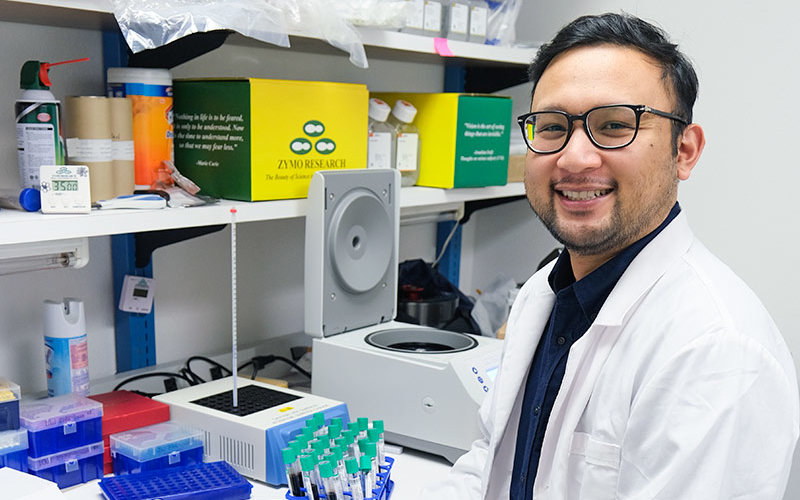
Science alumnus Luigi Basilio is on the forefront of helping to develop accurate testing to detect the new coronavirus and stop the spread of COVID-19.
“I’m very grateful to work at a company on the cutting edge of developing novel solutions for COVID-19,” said Basilio, a scientist at Zymo Research Corp., a biotechnology company based in Irvine.
“There’s a lot of scrambling going on in the U.S. to provide enough testing for suspected COVID-19 patients, first-responders, health care workers and other essential employees. We hope to help and do our part by making COVID-19 testing more readily available.”
Basilio credits his education and research experiences at Cal State Fullerton for giving him the knowledge and skill set to work in the science and technology industry.
As an undergraduate, he conducted research for three years under the mentorship of biological science professor Math P. Cuajungco. Basilio helped characterize a protein that Cuajuncgo’s lab recently published as a zinc transporter, which is potentially involved in the rare neurodegenerative disease, Mucolipidosis IV. He also co-authored a related published research paper.
“In Dr. Cuajungco’s lab, I learned research techniques that I use here at Zymo Research, and the laboratory experience helped me to transition into the biotechnology workforce and excel,” said Basilio, who earned awards for his research and was a scholar in the Louis Stokes Alliance for Minority Participation program.
Zymo Research specializes in providing biomedical tools and services to the scientific community in academic and clinical settings. The company is contributing to the development of the technology used to collect specimens, process samples and test for the novel coronavirus named SARS-CoV-2, which causes the disease called COVID-19.
“I’m honored to be working with a team, including fellow Titans, that is helping in the fight against COVID-19,” said Basilio, who earned a bachelor’s degree in biological science-cell and developmental biology in 2012.
Basilio helped develop the company’s trademarked technology that protects biological specimens during transport to the laboratory — this technology centers around ensuring an accurate method of specimen collection, while preserving quality until it is analyzed.
Zymo Research has developed a new testing process to detect the new coronavirus, which is already being used by a clinical lab in California, Basilio explained. The company is in the process of getting this new testing process authorized by the Federal Drug Administration through the emergency use authorization process to allow labs to utilize the test across the nation.
A critical part of COVID-19 testing is the specimen collection process through the use of nasal or throat swabs, predominantly done in a clinical setting by a health care provider. Zymo Research’s technology also is being utilized in a less invasive saliva-based collection method for COVID-19 testing, which was recently authorized by the FDA, Basilio added.
“The technology I helped develop for specimen collection and transport inactivates viruses, including the novel coronavirus, making specimens safer to handle, while preserving the virus’s signature for testing by laboratories,” he said. “This is particularly important for laboratories handling and conducting tests.”
Poor specimen collection and lack of preservation during the transport of specimens to a laboratory for testing can result in inaccurate results.
“This is a huge issue with many of the tests because the sample collected can degrade during transport and the result could be a false-negative,” Basilio said.
The company’s specimen collection technology has been widely used in scientific research. For instance, the company has collaborated with CSUF anthropology professor John Patton on his research on tribal communities on the Amazon River. The technology also was adopted by NASA for research aboard the International Space Station to mitigate human health risks related to spaceflight, Basilio said.
Contact: Debra Cano Ramos, dcanoramos@fullerton.edu